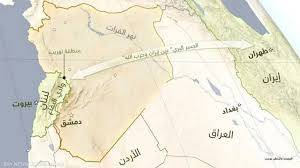Report: Syrian efforts to disrupt the last smuggling networks of "Iran" and "Hezbollah"

The American newspaper "The Washington Post" revealed Syria's efforts to disrupt the latest smuggling networks used to transport weapons and funds linked to Iran, indicating that the new Syrian leadership is working to dismantle what is known as the "land bridge," which Tehran relied on to expand its regional influence by financing and arming the Lebanese "Hezbollah" and other allied groups.
According to the report published in several media outlets, Syrian forces have intensified their operations in recent weeks to block the rugged border roads between Syria and Lebanon, which extend for about 233 miles, considered the last crossings of the "land bridge" network that Iran and its allies have used for years to smuggle weapons, funds, fuel, and drugs.
The newspaper explained that this network was one of the pillars that supported the former President Bashar al-Assad's regime, as well as a vital lifeline for "Hezbollah"; however, the scene changed drastically after the overthrow of Assad following the Syrian revolution last December, weakening Iranian influence in the region and isolating Tehran from its main ally in Lebanon.
From hot border areas like Houche Al Sayyed Ali, which witnessed fierce clashes, to abandoned Shia militia bases in the eastern cities of Al-Qusayr and Tadmur, the crossing points that Iran and its proxies previously controlled have turned into dilapidated places after the sudden withdrawal of the militias.
Local residents confirmed that "Hezbollah" fighters fled the area as Syrian revolutionary forces advanced from the north, without engaging in armed confrontations.
With its declining influence, Iran is trying _according to European and regional security officials_ to compensate for its losses by seeking new allies to maintain its supply lines and destabilize the new Syrian government.
On the other hand, "Hezbollah" is facing significant difficulties in replenishing its weapons stockpile and collecting donations, especially after its supporters in Beirut and southern Lebanon lost their properties due to the conflict, leading to bloody clashes with the Syrian army while attempting to cut off smuggling routes.
The newspaper noted that the border area with Lebanon remained a center for "Hezbollah" operations for 14 years, serving as a base for drug manufacturing, arms trafficking, and fighters' transit. During inspections, Syrian forces found 15 factories producing Captagon drugs, which generated tens of millions of dollars to support the Assad regime and its allied militias.
In the city of Al-Qusayr, just 6 miles from Lebanon, an entire industrial area has been transformed into a huge weapons depot equivalent to 50 football fields.
Nevertheless, Syrian analysts warn of the continued activity of some Iranian elements, especially those affiliated with "Hezbollah," as the Syrian government intercepted 12 shipments of weapons destined for Lebanon, including a shipment _revealed by the Interior Ministry in January_ containing hidden drones inside a truck carrying animal feed.
The "Washington Post" also pointed out Syrian accusations against Iran for involvement in recent violent acts on the Syrian coast, raising suspicions about its role in undermining stability under the cover of smuggling operations.